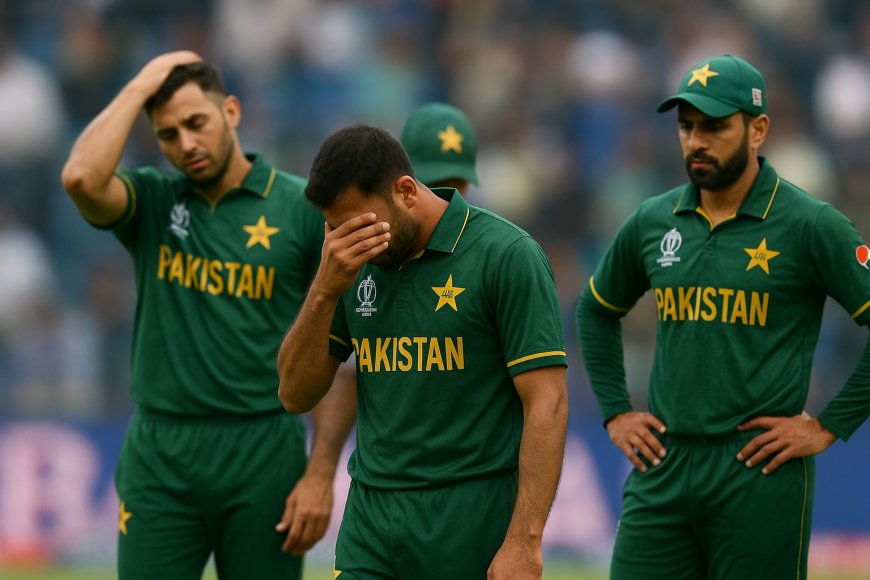Fall of Pakistan Cricket Team
The fall of Pakistan cricket team highlights poor management, inconsistent performance, and lack of long term planning that weakened its global standing.

Fall of Pakistan Cricket Team
Introduction
Pakistan cricket has always been a story of glorious highs and heartbreaking lows. Once crowned as World Cup champions in 1992 and winners of the ICC T20 World Cup in 2009, the team has gradually slipped into inconsistency and mediocrity. The decline of Pakistan cricket is not just about losing matches; it is about mismanagement, lack of vision, and failure to build a strong system for the future.
1. The Golden Era and High Expectations
In the 1980s and 1990s, Pakistan produced legends like Imran Khan, Wasim Akram, Waqar Younis, Javed Miandad, and Saeed Anwar. These icons set high standards, raising expectations that Pakistan would remain a dominant force in world cricket.
2. Inconsistency After 1992 World Cup
Following the 1992 triumph, Pakistan cricket struggled to maintain consistency. While there were moments of brilliance, the inability to form a stable team culture became evident.
3. Mismanagement in the Cricket Board
One of the biggest reasons behind the fall is the constant changes in Pakistan Cricket Board (PCB) leadership. Frequent shifts in chairmen, selectors, and management disrupted long-term planning and affected team stability.
4. Player Politics and Lack of Unity
Team politics has plagued Pakistan cricket for decades. Internal rivalries, favoritism, and lack of unity damaged team spirit and often overshadowed talent on the field.
5. Decline in Batting Strength
While Pakistan always had world-class bowlers, the batting unit remained fragile. The absence of reliable middle-order batsmen after the retirement of Inzamam-ul-Haq and Mohammad Yousuf left a massive void.
6. Overreliance on Raw Talent
Pakistan has often relied on raw, unpolished talent rather than developing players through strong domestic systems. This approach brought short-term success but failed to produce consistent match-winners.
7. Domestic Cricket Issues
Weak domestic structure, lack of facilities, and limited investment in grassroots cricket contributed heavily to the fall. Unlike India, Australia, or England, Pakistan failed to modernize its cricketing infrastructure.
8. Declining Standards in Fitness and Discipline
Modern cricket demands peak fitness and discipline. Many Pakistani players struggled with these requirements, leading to poor performances against fitter and more professional international teams.
9. Missed Opportunities in ICC Tournaments
Despite reaching the semifinals and finals at times, Pakistan often collapsed under pressure in major tournaments. This inability to handle big-match situations reflects mental weakness and poor preparation.
10. The Way Forward
To revive its glory, Pakistan cricket needs a strong domestic structure, professional management, modern coaching methods, and a focus on discipline. Only then can Pakistan hope to rise again and compete with the best.
FAQs
Q1: When did Pakistan last win an ICC tournament?
Pakistan last won the ICC Champions Trophy in 2017 by defeating India in the final.
Q2: What is the main reason behind the decline of Pakistan cricket?
Poor management, weak domestic structure, and inconsistency are the main reasons.
Q3: Has Pakistan cricket produced legendary players despite its decline?
Yes, stars like Misbah-ul-Haq, Younis Khan, and Babar Azam emerged, but not enough to maintain dominance.
Q4: How can Pakistan improve its cricket team?
By investing in grassroots cricket, improving fitness standards, and ensuring professional management.
Q5: Is there still hope for Pakistan cricket?
Yes, with young talents like Shaheen Afridi and Babar Azam, Pakistan has the potential to rebuild if reforms are made.
Conclusion
The fall of Pakistan cricket is a painful reality for fans worldwide. Once feared for its unpredictability and match-winning talent, Pakistan now struggles with inconsistency and management failures. However, the future can still be bright if bold steps are taken to fix the system, nurture young players, and bring discipline back into the team.
What's Your Reaction?
 Like
0
Like
0
 Dislike
0
Dislike
0
 Love
0
Love
0
 Funny
0
Funny
0
 Angry
0
Angry
0
 Sad
0
Sad
0
 Wow
0
Wow
0





















